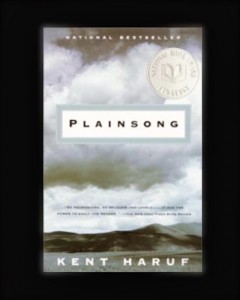Book Review: Plainsong
Plain is an interesting word. It can be a noun, adjective, or adverb.
I usually think of it as an adjective as in, "The boy had a plain face" or "The song had a plain melody."
Through the adjective lens, no one wants to be plain. Plain is code word for dull.
Or is it?
Funny enough, while Kent Haruf's book evokes an image of plain - even the cover is grey and the story takes place on the plains (a noun) in Eastern Colorado - dull it is not. Was the author aware of this conflicting message? I'm guessing he did. In fact, I think Haruf plays on the title because the characters he paints are, by all first appearances, plain.
And yet, the narrative is profound in its simplicity.
In fact, this story sneaks up on you precisely because its title elicits a ho-hum response. I was hooked about 500 hundred words into the book by Haruf's terrific prose.
For instance, there's a very old woman who befriends the twin boys who deliver her newspaper. She is gruff with them and carefully tries to acknowledge the fact that their mother abandoned them. She asks them to make her cookies and barks orders all along the way. Finally she says,
“You understand? If you can read you can cook. You can always feed yourselves. You remember that.”
Not much to those sentences, but in the context of the story, as a reader, you love this subtle act of grace.
In a similar way, we see are introduced to characters with subtle descriptions:
“Here was this man Tom Guthrie in Holt standing at the back window in the kitchen of his house smoking cigarettes and looking out over the back lot where the sun was just coming up.”
Every single person is introduced with this simple prose. In snippets it doesn't sound like much of a story, and yet it all works. Somehow the language moves out of the way and what you see is the complexity of the characters.
So while this isn't a life-changing, soul-shaking, rock-the-world tale, I was thoroughly entranced.
One of my favorite paragraphs jumped out because it describes the twins riding their horse, Easter.
“Often in the morning they rode out along the tracks on Easter and took their lunch and once rode as far as the little cemetery halfway to Norka where there was a stand of cottonwood trees with their leaves washing and turning in the wind, and they ate lunch there in the freckled shade of the trees and came back in the late afternoon with the sun sliding down behind them, making a single shadow of them and the horse together, the shadow out in front like a thin dark antic precursor of what they were about to become.”
In this brief narrative, what I saw was the freedom of my childhood where I would ride my horse to all kinds of places (good and bad), and I loved the twins as though they were part of me. When a book calls forth that kind of emotion, well, I have to recommend it to you.

